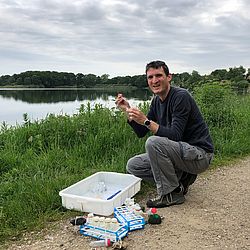Dr. Peter Deines

Research Division 3: Marine Ecology
Research Unit: Marine Symbioses
Office:
Room: HB-124 (Hohenbergstraße 2)
Phone: +49 431 600-4485
Fax: +49 431 600-4482
Email: pdeines@geomar.de
Mailing address:
Düsternbrooker Weg 20, 24105 Kiel
Research Interests
My research centres on the ecology and evolution of microbial communities and microbial symbioses. I am particularly fascinated by host-associated microbial communities (microbiomes) that live on host surfaces, are associated with different tissues, and can reside inter- and intracellularly.
Investigating the interplay of ecological interactions in microbiomes in biotic and abiotic environments is a current research interest of mine. Presently I study marine plastic debris, particularly the role of microbial communities in plastic degradation.
Keywords: aquatic systems, microbial ecology, host-microbiota interactions, microbiome, community dynamics, evolution & function, food webs, ecological systems biology
To learn more about my research, visit my website. (link http://peterdeines.mystrikingly.com)
Teaching statement
As a scientist, I truly enjoy teaching and educating students at all levels. My long-term experience in teaching university courses encompasses providing lectures, labs, and tutorials in the subjects of zoology, physiology, ecology, cell biology, microbiology, and molecular biology at Bachelor and Master level. Being able to teach across disciplines allows me to promote in particular the integration of macrobiology and microbiology, which I believe is key for future biologists. I have a continuous track record since 2007 in teaching at universities in Germany, UK, and New Zealand and I teach both in German and English. Since 2020, I have been involved in the course “Current Topics in Marine Ecology” at GEOMAR.
A central goal of my teaching is supporting the independent learning process of students. I believe that this can be best achieved through the integration of research into teaching by exposing students to practical work from early on during their studies, which emphasizes the importance of excursions, fieldwork, and laboratory internships. Dedicated literature seminars, where students present current research topics to their peers and write small proposals/opinion pieces trains them in how to access, present and discuss scientific literature fostering the engagement of students and their independent enquiry.
Professional Experience
2020 – today GEOMAR Helmholtz Centre for Ocean Research Kiel (Germany)
2015 – 2020 Marie Skłodowska-Curie & DAAD Postdoctoral Fellow Zoological Institute, Christian Albrechts University Kiel (Germany)
2011 – 2014 Postdoctoral Teaching Fellow Institute of Natural & Mathematical Sciences, Massey University (New Zealand)
2009 – 2011 Alexander von Humboldt Fellow School of Biological Sciences, The University of Auckland (New Zealand)
2007 – 2009 Marie Skłodowska-Curie Postdoctoral Fellow Chemical and Biological Engineering, The University of Sheffield (UK)
2003 – 2006 PhD, Natural Sciences (Biology) Max Planck Institute for Limnology, Plön & Christian Albrechts University Kiel (Germany)
1996 – 2002 Diploma, Biological Sciences Max Planck Institute for Limnology, Plön, Christian Albrechts University Kiel & GEOMAR Helmholtz Centre for Ocean Research Kiel (Germany)
Selected Publications
Full list of publications GOOGLE SCHOLAR: (link https://scholar.google.de/citations?user=f40B-_kAAAAJ&hl=en)
Borchert E, Hammerschmidt K, Hentschel U and Deines P (2021) Enhancing Microbial Pollutant Degradation by Integrating Eco-Evolutionary Principles with Environmental Biotechnology. Trends Microbiol., https://doi.org/10.1016/j.tim.2021.03.002
He, J., Lange, J., Marinos, G., Bathia, J., Harris, D., Soluch, R., Vaibhvi, V., Deines, P., Hassani, M., Wagner, K.S., Zapien-Campos, R., Jaspers, C. & Sommer, F. (2020) Advancing our functional understanding of host–microbiota interactions: a need for new types of studies. BioEssays 1900211.
Deines, P., Hammerschmidt, K. & Bosch, T.C.G. (2019) Microbial traits and the realized niche in a simple metaorganism. bioRxiv, 814798.
Deines, P., Hammerschmidt, K. & Bosch, T.C.G. (2019) Fitness effects of host-bacterial interactions – the microbial perspective. bioRxiv, 609271.
Lachnit, T, Bosch, T.C.G., & Deines, P. (2019) Exposure of the host-associated microbiome to nutrient-rich conditions may lead to dysbiosis and disease development - an evolutionary perspective. mBio 10:e00355-19.
West, A.G., Waite, D.W., Deines, P., Bourne, D.G., Digby, A., McKenzie, V.J. & Taylor, M.W. (2019) The microbiome in threatened species conservation. Biological Conservation 229, 85-98.
Bang, C., Dagan, T., Deines, P., Dubilier, N., et al. (2018) Metaorganisms in extreme environments: do microbes play a role in organismal adaptation? Zoology 127, 1-19.
Deines, P., Lachnit, T. & Bosch, T.C.G. (2017) Competing forces maintain the Hydra metaorganism. Immunological Reviews 279, 123-136.
Deines, P. & Bosch, T.C.G. (2016) Transitioning from microbiome composition to microbial community interactions: the potential of the metaorganism Hydra as an experimental model. Frontiers in Microbiology 7:1610.
Simister, R.L., Taylor, M.W., Rogers, K.M., Schupp, P.J. & Deines, P. (2013) Temporal molecular and isotopic analysis of active bacterial communities in two New Zealand sponges. FEMS Microbiology Ecology 85, 195-209.
Simister, R.L., Deines, P., Botté, E.S., Webster, N.S. & Taylor, M.W. (2012) Sponge-specific clusters revisited: a comprehensive phylogeny of sponge-associated microorganisms. Environmental Microbiology 14, 517-524.


